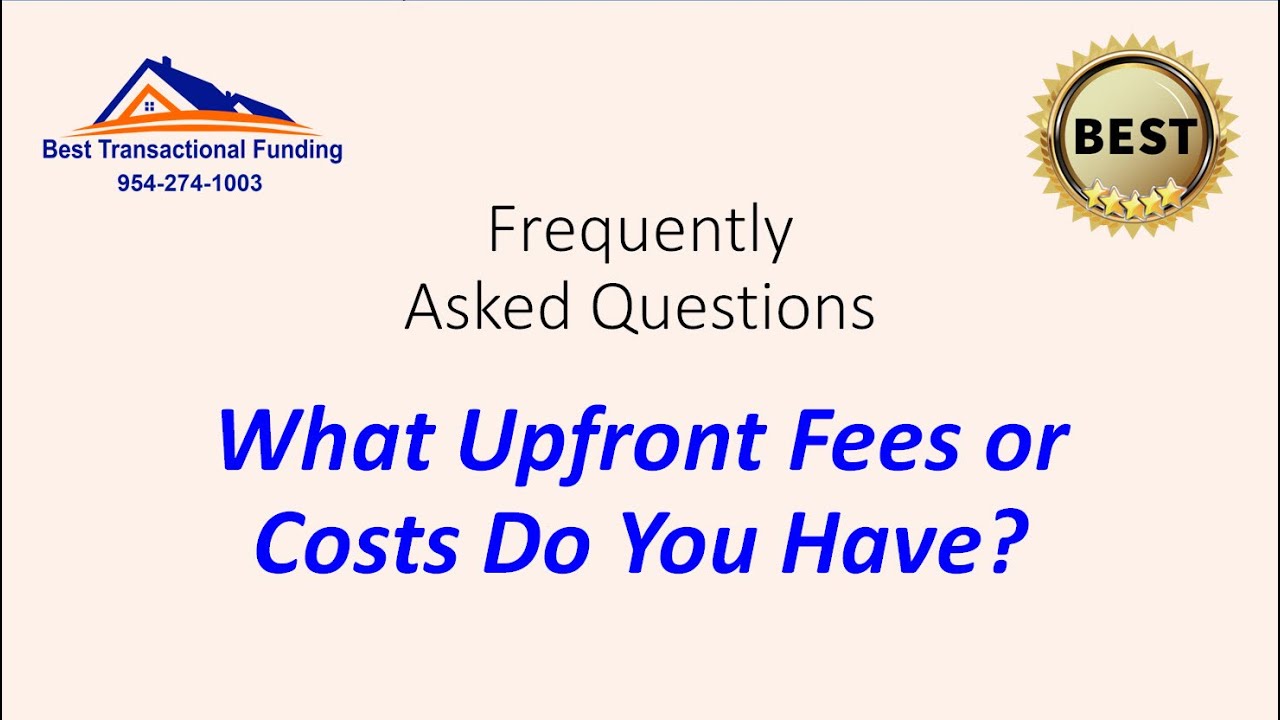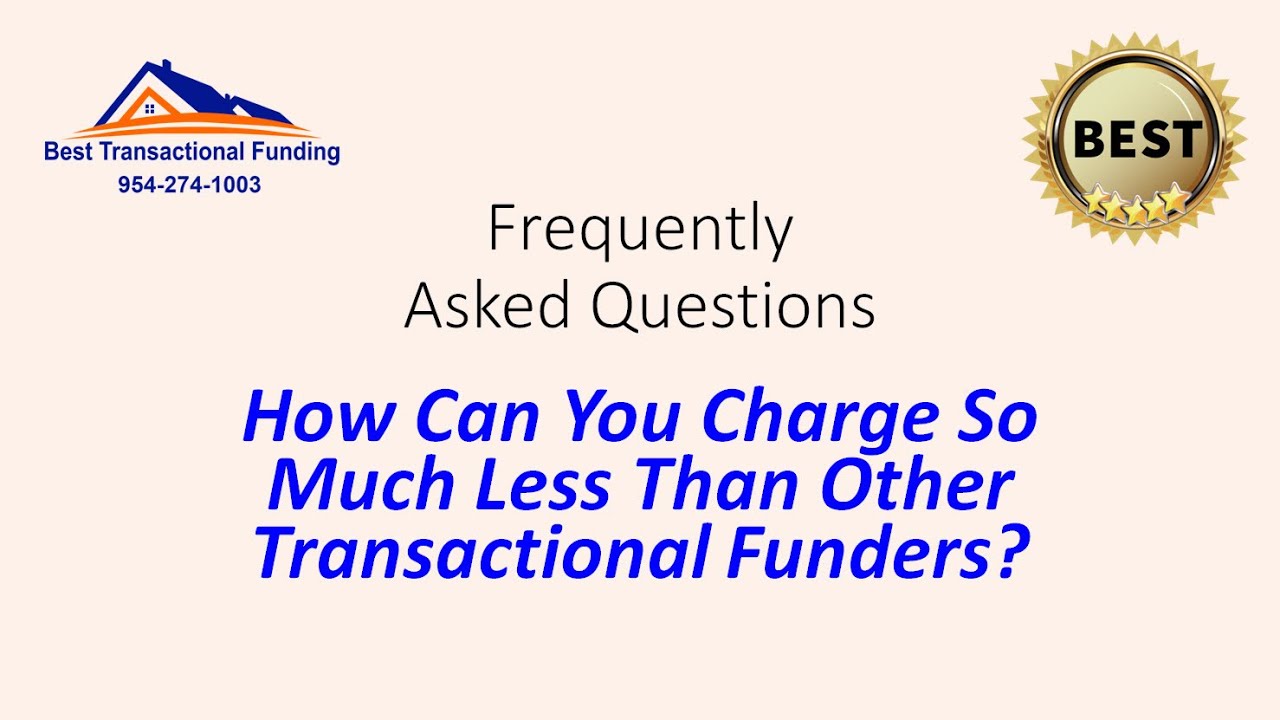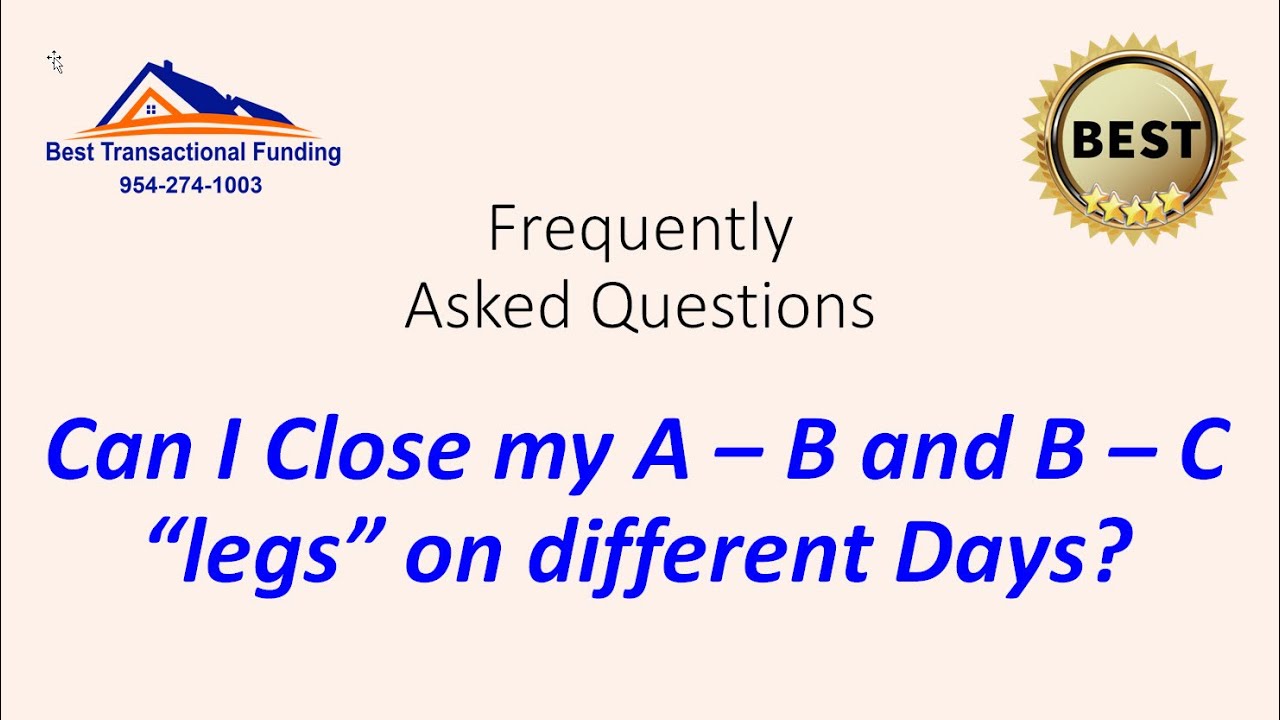The funding process starts when an investor gets a property under contract from a seller. It can be a single-family home (SFH) or a multi-family property but the key to the transaction is the investor doesn’t have the money to close the purchase with his seller. Another reason can be because the investor’s profit is substantial enough that he doesn’t want the original seller or his end-buyer to know just how large. Once the investor has found a buyer, then, and only then can close the purchase with the seller and then sell to his end-buyer and make a profit.
Transactional Funding is a method of supplying money for an investor’s purchase of a property which has already been resold to an end-buyer. The money is usually used for less than a complete day as the investor closes with the seller and later in the day his end-buyer closes.
Lenders doing short sales and selling REOs (bank-owned properties) do not allow the investor/buyer to assign his contract. The exception is if there is a relationship between the investor and the assignee – usually a funding source who wants their name on the title. However, there is no guarantee that the lender will allow the name change on the contract before closing.
Another reason that Assignments aren’t used is the seller, their listing agent or their attorney will not allow it. Finally, if the profit to the investor for the transaction is “too large” by the seller’s or end-buyer’s standards, either party may not close. If the net profit to the investor is greater than $10,000 to 15,000+/-, the cost of Transactional Funding for a double closing is inexpensive compared to the possible loss of the deal if either the seller or buyer don’t close!
These letters are most often used in reference to a double closing where “A” is the original property seller, “B” is the investor and “C” is the end-buyer. A Double Closing is then shown as A – B and B – C double transactions.
A Double Closing is defined as the closing of the purchase and sale of a property twice in the same day. The end-buyer can close first or second, but the original seller must close the same day to be able to use Transactional Funding. If the A – B “leg” closes on one day and the B – C leg closes another day, “extended” Transactional Funding is required. This extended use of the money will be a hard money loan and will usually need a mortgage and note to secure the lender’s money.
This term is often used in place of the term Double Closing. However, for knowledgeable people in the industry, the simultaneous close means that there are “three interested parties” represented at the closing – the seller, the buyer/investor and the lender who is closing a mortgage on the property. The mortgage is then closed “simultaneously” with the purchase and sale of the property.
A hard money loan is a loan on a real estate property’s purchase where the property is not resold the same day it is purchased. The interest rate on hard money loans reflect the risk involved in holding a property in the local real estate market and later possibly having to foreclose on it. The success of the loan is also a function of whether the rehab and resale of the property is successful.
The cost for hard money loans varies greatly, as these lenders may include costs for document prep fees, inspection and miscellaneous costs as well as points for loan origination. In the lending industry, one point = 1% of the purchase or sale price if applicable. Hard money loans additionally have an annual interest rate. The points can be as little as 1 point to as many as 10 points and the interest rates can be from 8% to 20% annually.
For a $100,000 loan with three points ($3,000) and doc prep fees of $1,000 with an interest rate of 12% for six months = $3,000 + $1,000 + (12% x $100,000/12 X 6 = $6,000) = $4,000 + $6,000 = $10,000 total in this example or a net of 10% of the money borrowed. Transactional Funding on the same amount could be as little as $1,050.
Private Money is money that will be loaned to an investor/buyer that does not come from a licensed mortgage lender. Essentially, the Private Lender uses his savings or retirement monies to fund real estate transactions. Private money lenders are preferred to hard money lenders because their cost to borrow can be much less than hard money lenders. Seldom do Private Money lenders loan Transactional Funding because of the complicated nature of the double closings, the required precise transfer of the monies, title issues and fraud by sellers and buyers.
In years past, closing agents would accept a Cashier’s Check from a buyer and he would pay the seller with a “Trust Account Check”. Because of a huge amount of fraudulent cashier’s checks, very few closing agents will accept a cashier’s check from a buyer.
The standard for paying what is due on a real estate closing today is domestic wired funds. I say “domestic” because international wires can have transfer balance limits and are often held by the Federal Reserve for hours or days for security reasons. If you are going to work with an international buyer, have him wire his funds into the closing agent’s escrow account at least two days before the actual closing to make sure he can close timely.
Generally speaking, if not done properly, this is the fabled “Illegal Flip” that has maliciously branded investors as law breakers. If you decide to try asking the end-buyer to use his money, you’ll need him, the seller, yourself and the closing agent to sign a Disclaimer stating all these parties know what you are doing and agree. I have seen this Disclaimer kill every deal where the investor tried to use it. The investor’s goal is to save a few dollars of funding costs with the much more common result of losing the deal. Many closing agents and Title Insurers will not allow this end-buyer’s money to be used for the A – B leg under any circumstances!
Most Transactional Funders will not do these “double agent” transactions because they feel they lack control. Almost without exception, REO purchases will require you have the A – B leg closed through the closing agent of the lender’s choice.
Unfortunately, the lenders may also have resale restrictions (deed restrictions) as to how long the buyer has to hold the property before he can transfer it’s deed. Short sales can usually be closed at the closing agent chosen by the investor in the A – B transaction. Obviously, we prefer the B – C leg closed with our preferred closing agents, but we understand that this is not always possible, and we may not be able to fund the A – B transaction. Ask ahead so there are no surprises.
I have a survey on this website that compares our rates with local and national lenders. When you shop for this real estate service, make sure you know all the fees you will be required to pay. Also weigh the experience of the funder so you are confident he will close timely.
We need our Funding Requirements Agreement signed which we will send you, your seller and buyer signed A – B and B – C contracts, contact information for the closing agent, the Preliminary HUD Closing Statements for both the A – B and B – C closing legs.
Any additional information that we may need will have to be in our hands at least 12 hours before the closing. There are no fees other than the funding and wire fees, that we charge for the transaction. The closing agent may charge a document prep fee if the closing is extended past the second day, which you must discuss with the closing agent.
While this doesn’t happen very often, it is always a threat. If the end-buyer decides not to close, he risks his Earnest Money Deposit (EMD) which may not bother him. The result is the investor will also likely lose his EMD. He may also lose the deal unless the Transactional Funder is willing to “convert” the closed A – B transaction to a hard money loan. Most Transactional Funders has stopped doing any Extended Transactional Funding.
The best way to head-off this undesirable possibility is to have the closing agent, and yourself, stay in touch with your end-buyer to alert him to what is happening and how soon he needs to be ready to wire his money. Also, a good preventative measure is to get him a Preliminary HUD-1 Closing Statement at least a few days before closing.
We provide transactional funding in the following states Alaska, Alabama, Colorado, Connecticut, Washington DC, Delaware, Florida, Georgia, Idaho, Illinois, Indiana, Iowa, Kansas, Kentucky, Louisiana, Maine, Maryland, Massachusetts, Michigan, Mississippi, Missouri, Montana, Nebraska, New Hampshire, New Jersey, New Mexico, North Carolina, Ohio, Oklahoma, Pennsylvania, Rhode Island, Tennessee, Texas, Virginia, Washington, West Virginia, Wisconsin, and Wyoming. Please call to confirm as laws can change quickly in varying states.
We do not offer any extended transactional funding. We only offer same-day closings, and they must close at the same closing agent.






